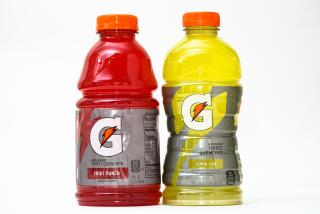Pesticide Makers Facing Lower Profits, Sales, Foreign Takeovers, Journal Warns
- Share via
WASHINGTON — Pesticide manufacturers who enjoyed a boom and big profit margins in the 1970s are facing lower prices and profits, flat sales and increasing foreign takeovers as farmers are using less.
Those are conclusions from a recent special article in Chemical and Engineering News, a weekly trade magazine for the chemical industry, on the pesticide business.
Total use of pesticides on U.S. farms this year should be about 430 million pounds, down 9% from last year, as acreage planted falls about 8% to 330 million acres, according to the magazine, quoting Agriculture Department reports.
“Rising costs in the mid- and late 1970s gave farmers an education in managing their inputs that they have not forgotten,” the article said.
“Farmers now have learned that additional pesticides may not be worth the increased cost per acre. And this has been coupled with an increasing environmental and safety awareness among farmers, who have seen some of their most frequently used pesticides banned or restricted by environmental pressures.”
The study quoted contrasting predictions. Pessimism came from Frost & Sullivan, a New York City market research firm.
Frost & Sullivan was quoted as arguing that only growth in planted acreage can increase pesticide use, since all potential pesticide users are users, in fact. But acreage might decline under productivity increases, continued falling foreign demand, further declines in per-capita consumption of red meat, and growing sophistication and numbers of computer-equipped farmers figuring out their exact needs and avoiding excess applications.
Freedonia Group of Cleveland Heights, Ohio, however, saw dollar volume growing at 5% a year in 1985-90 and usage growing at the same rate. This would be down from rates above 11% per year in 1970-85.
A favorable economy and technological advances will encourage growth, with herbicides favored and insecticides and fungicides facing more limited markets, Freedonia said.
The article said “most industry sources” believe advances in biotechnology will not affect pesticides for another 10 years because it will take that long to get new products approved by the Environmental Protection Agency.
In 20 years, just 5% to 15% of farmer pesticide budgets will be spent on these new chemicals, it predicted.
Exports are a bright spot. They rose from $1.2 billion to $1.4 billion last year and this year could surpass the 1985 peak of $1.5 billion. Imports, however, are also growing, and the surplus of exports over imports at $1 billion last year was off from its 1984 peak of $1.12 billion, according to the department.
Prices are weak. The department’s composite price index for insecticides fell 2.3%, from $10.49 per pound of active ingredient in 1985 to $10.25 in 1987. The herbicide index was almost unchanged, at $4.05 contrasted with $4.06.
Increased testing requirements may be leading companies to switch research and development budgets away from new products, which were coming on the market at about 40 a year in the mid-1960s but are now fewer than 10 a year, the article said.
The pressures have led many companies to sell out in recent years, often to foreigners. The article noted that Velsicol is now owned by Sandoz, a Swiss firm. France’s Rhone-Poulenc bought Union Carbide’s pesticide operations. Germany’s BASF took over the Blazer line of herbicides from Rohm & Haas. Britain’s ICI now owns the agricultural chemicals business that Stauffer Chemical Co. used to have.
Just six of 1970’s top 10 pesticide makers were in the business in 1986. Five on the 1986 list were foreign-owned compared with two in 1970.
“Payout in the agricultural chemicals business is becoming so long-term U.S. companies may not want to take the risk,” the magazine said.
Foreign companies “are willing to wait for their returns, whereas U.S. companies demand shorter-term profits.”
For this reason, pharmaceutical companies, familiar with government regulation of drugs and the wait for profits from an item that eventually loses patent protection, are more comfortable in the pesticide business than general chemical companies.
More to Read
Inside the business of entertainment
The Wide Shot brings you news, analysis and insights on everything from streaming wars to production — and what it all means for the future.
You may occasionally receive promotional content from the Los Angeles Times.










